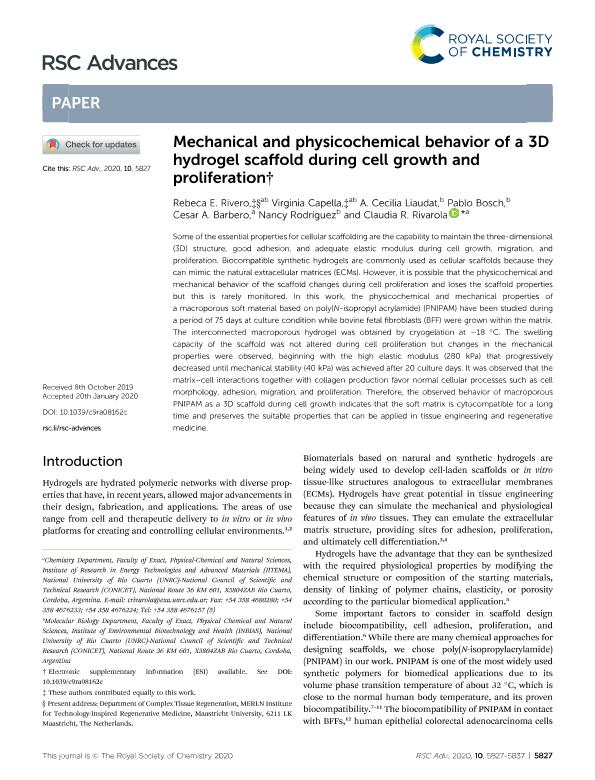Artículo
Mechanical and physicochemical behavior of a 3D hydrogel scaffold during cell growth and proliferation
Rivero, Rebeca Edith ; Capella, Virginia
; Capella, Virginia ; Liaudat, Ana Cecilia
; Liaudat, Ana Cecilia ; Bosch, Pablo
; Bosch, Pablo ; Barbero, César Alfredo
; Barbero, César Alfredo ; Rodriguez, Nancy; Rivarola, Claudia Rosana
; Rodriguez, Nancy; Rivarola, Claudia Rosana
 ; Capella, Virginia
; Capella, Virginia ; Liaudat, Ana Cecilia
; Liaudat, Ana Cecilia ; Bosch, Pablo
; Bosch, Pablo ; Barbero, César Alfredo
; Barbero, César Alfredo ; Rodriguez, Nancy; Rivarola, Claudia Rosana
; Rodriguez, Nancy; Rivarola, Claudia Rosana
Fecha de publicación:
02/2020
Editorial:
Royal Society of Chemistry
Revista:
RSC Advances
ISSN:
2046-2069
Idioma:
Inglés
Tipo de recurso:
Artículo publicado
Clasificación temática:
Resumen
Some of the essential properties for cellular scaffolding are the capability to maintain the three-dimensional (3D) structure, good adhesion, and adequate elastic modulus during cell growth, migration, and proliferation. Biocompatible synthetic hydrogels are commonly used as cellular scaffolds because they can mimic the natural extracellular matrices (ECMs). However, it is possible that the physicochemical and mechanical behavior of the scaffold changes during cell proliferation and loses the scaffold properties but this is rarely monitored. In this work, the physicochemical and mechanical properties of a macroporous soft material based on poly(N-isopropyl acrylamide) (PNIPAM) have been studied during a period of 75 days at culture condition while bovine fetal fibroblasts (BFF) were grown within the matrix. The interconnected macroporous hydrogel was obtained by cryogelation at -18 °C. The swelling capacity of the scaffold was not altered during cell proliferation but changes in the mechanical properties were observed, beginning with the high elastic modulus (280 kPa) that progressively decreased until mechanical stability (40 kPa) was achieved after 20 culture days. It was observed that the matrix-cell interactions together with collagen production favor normal cellular processes such as cell morphology, adhesion, migration, and proliferation. Therefore, the observed behavior of macroporous PNIPAM as a 3D scaffold during cell growth indicates that the soft matrix is cytocompatible for a long time and preserves the suitable properties that can be applied in tissue engineering and regenerative medicine.
Palabras clave:
HYDROGEL
,
PNIPAM
,
FIBROBLASTS
,
SCAFFOLD
Archivos asociados
Licencia
Identificadores
Colecciones
Articulos (IITEMA)
Articulos de INSTITUTO DE INVESTIGACIONES EN TECNOLOGIAS ENERGETICAS Y MATERIALES AVANZADOS
Articulos de INSTITUTO DE INVESTIGACIONES EN TECNOLOGIAS ENERGETICAS Y MATERIALES AVANZADOS
Articulos (INBIAS)
Articulos de INSTITUTO DE BIOTECNOLOGIA AMBIENTAL Y SALUD
Articulos de INSTITUTO DE BIOTECNOLOGIA AMBIENTAL Y SALUD
Articulos(CCT - CORDOBA)
Articulos de CTRO.CIENTIFICO TECNOL.CONICET - CORDOBA
Articulos de CTRO.CIENTIFICO TECNOL.CONICET - CORDOBA
Citación
Rivero, Rebeca Edith; Capella, Virginia; Liaudat, Ana Cecilia; Bosch, Pablo; Barbero, César Alfredo; et al.; Mechanical and physicochemical behavior of a 3D hydrogel scaffold during cell growth and proliferation; Royal Society of Chemistry; RSC Advances; 10; 10; 2-2020; 5827-5837
Compartir
Altmétricas



